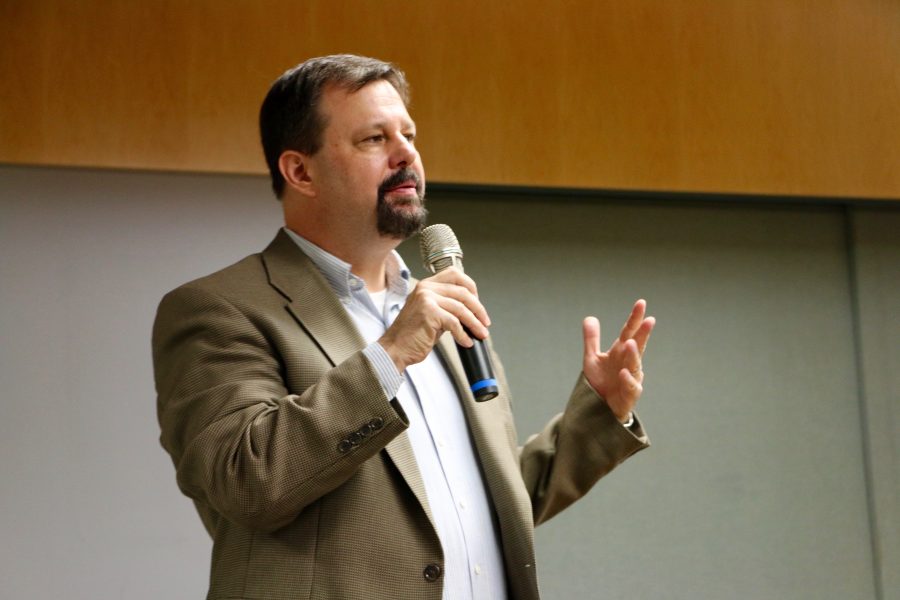“Saying that an institution is rigged is invoking a crisis,” says journalist Chuck McCutcheon. This is especially true this November, as the world works itself into a frenzy over US presidential candidates’ provocative statements. “Rigged” and other political jargon words often incite extreme emotion in viewers, leaving spectators confused all the while about a candidate’s true policies. But, as Mr. McCutcheon explained at a Soochow University lecture in Taipei on October 5th, the media has the power to cut through the alarm bells politicians are ringing and clarify fearmongering rhetoric.
On the other hand, constant changes in the journalism industry also shift the roles of news writers. The very nature of media and journalism is constantly shifting, especially in regard to current events. Millennials, as well as older demographics, are beginning to turn to sources outside traditional journalism, with areas such as social media becoming platforms for political discourse. “I guiltily admit to getting the majority of my day-to-day news from my Facebook newsfeed, Tumblr, and my mother,” says former Blue and Gold editor-in-chief Rebecca Tseng. This is an increasingly widespread phenomenon: according to a Pew Research Center study, a third of American adults under 30 now regularly use social media as a primary source of information.
The platform is not the only aspect of political journalism to change: the very nature of current events discussion in the US is shifting away from a traditional two-party debate. According to Mr. McCutcheon, millennials are becoming increasingly disenchanted with the state of traditional political institutions. “If you’re younger than 21 or 22 years old in America, you have never seen Congress work effectively,” he says. This has manifested in a rise in identification with independent candidates: another Pew study reports half of millennials unaligned with either the Democratic and Republican party. As a result, anti-establishment politicians such as Gary Johnson and Jill Stein have faced surprising success, crowdfunding millions of dollars for their campaigns.
These two factors combine to create a distinct political atmosphere, as social media fuels the rise of populists like Trump and Sanders. As Mr. McCutcheon says, “Populism has been around for centuries. What distinguishes it these days… is how politicians such as Trump and Sanders have…[instilled] a sense of “it’s us against them” in followers – through Twitter, Facebook and other social media.”
However, the dangers of social media as news sources are also becoming quickly apparent: while the refreshing nature of unfiltered social media posting is appealing to young voters, the way it transforms discussion of current events can be dangerous. Satirical news sources such as The Onion, which humorously twist current events coverage, may be taken as truth, causing misconceptions to run amok.
Some writers devote their careers toward decoding and clarifying one-liners scripted by politicians: “In the all-pervasive Twitter age, journalists are constantly on guard against zingers,” Mr. McCutcheon says. Other news outlets do not have such noble intent. “Politicians’ fiery, no-holds-barred rhetoric has drawn nonstop coverage from click- and viewer-hungry news outlets,” he says.
Traditional media needs to be responsible and emulate the positive aspects of social media, Mr. McCutcheon concludes. To make journalism great again, so to speak, independent media sources need to strive for increased transparency and objectivity. Newspapers are beginning to separate their political alignments from their news sections: the Chicago Tribune, for example, has heavily criticized Gary Johnson in their headlines while endorsing him for the presidency in their editorials. And on our part, we, as millennials, have the power and the responsibility to be active in our criticism and involvement in the next waves of leadership.


![A myriad of impressive trophies and awards. [ANNABELLE HSU/THE BLUE & GOLD]](https://blueandgoldonline.org/wp-content/uploads/2025/09/Awards2-1200x512.jpeg)
![Students' calendars say goodbye to exam week. [ANNABELLE HSU/THE BLUE & GOLD]](https://blueandgoldonline.org/wp-content/uploads/2025/09/Exam-week-1200x740.jpg)
![A collection of college flags. [PHOTO COURTESY OF AMBER HU ('27)]](https://blueandgoldonline.org/wp-content/uploads/2025/05/IMG_5029-1200x577.jpeg)

![An SAT word cloud. [PHOTO COURTESY OF WORDCLOUDS]](https://blueandgoldonline.org/wp-content/uploads/2025/05/SAT.jpeg)
![Collage of banned books, including “The Handmaid’s Tale” by Margaret Atwood. [MINSUN KIM/ THE BLUE & GOLD]](https://blueandgoldonline.org/wp-content/uploads/2025/04/IMG_4274-1200x681.jpeg)